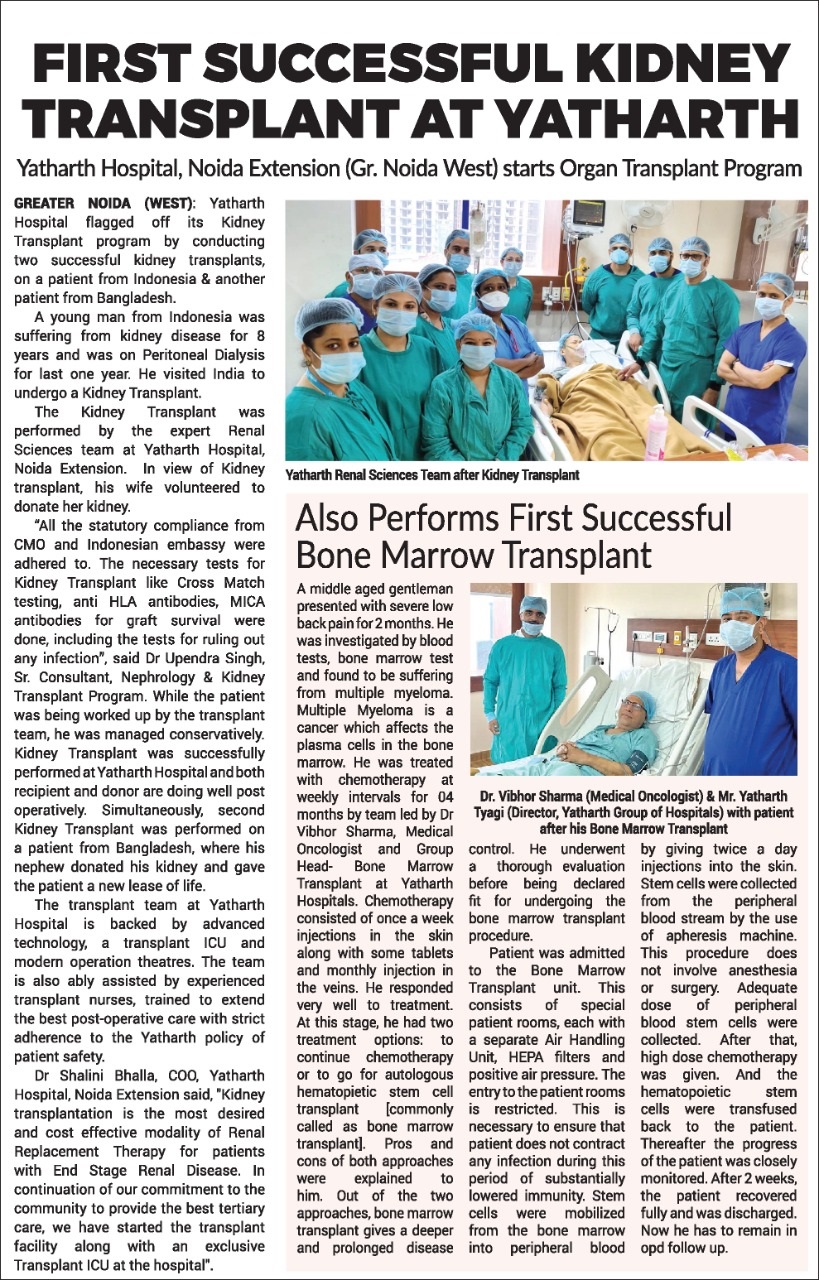First Successful Kidney Transplant And Bone Marrow Transplant At Yatharth Hospital
Yatharth Hospital, Noida Extension (Gr. Noida West) starts Organ Transplant Program
Yatharth Hospital flagged off its Kidney Transplant program by conducting two successful kidney transplants on the day of the launch, a patient from Indonesia and another patient from Bangladesh.
A young man from Indonesia was suffering from kidney disease for 8 years and was on Peritoneal Dialysis for last one year. He visited India to undergo a Kidney Transplant. The Kidney Transplant was performed by the expert Renal Sciences team at Yatharth Hospital, Noida Extension. In view of Kidney transplant, his wife volunteered to donate her kidney.
“All the statutory compliance from CMO and Cambodian embassy were adhered to. The necessary tests for Kidney Transplant like Cross Match testing, anti HLA antibodies, MICA antibodies were done, including the tests for ruling out any infection” said Dr Upendra Singh, Nephrologist and Sr. Consultant, Kidney Transplant Program. While the patient was being worked up by the transplant team, patient was being managed conservatively. Kidney Transplant was successfully performed at Yatharth Hospital and both recipient and donor are doing well post operatively. Simultaneously, second Kidney Transplant was performed on a patient from Bangladesh, where his nephew donated his kidney and gave the patient a new lease of life.
The transplant team at Yatharth Hospital is further backed by advanced technology, Transplant ICU and advanced operation theatres. The team is also ably assisted by experienced transplant nurses trained to extend the best post-operative care with strict adherence to the Yatharth policy of patient safety.
Dr Shalini Bhalla, COO, Yatharth Hospital, Noida Extension said, "Kidney transplantation is the most desired and cost effective modality of Renal Replacement Therapy for patients with End Stage Renal Disease. In continuation of our commitment to the community to provide the best of tertiary care, we have started the transplant facility along with an exclusive transplant ICU at the hospital".
Also successfully done first bone marrow transplant by team headed by Dr Vibhor Sharma, Medical Oncologist and Group Head, Bone Marrow Transplant
A middle aged gentleman presented with severe low back pain for 2 months. He was investigated by blood tests, bone marrow test and found to be suffering from multiple myeloma. Multiple Myeloma is a cancer which affects the plasma cells in the bone marrow. He was treated with chemotherapy at weekly intervals for 04 months. Chemotherapy consisted of once a week injections in the skin along with some tablets and monthly injection in the veins. He responded very well to treatment. At this stage, he had two treatment options: to continue chemotherapy or to go for autologous hematopietic stem cell transplant [commonly called as bone marrow transplant]. Pros and cons of both approaches were explained to him. Out of the two approaches, bone marrow transplant gives a deeper and prolonged disease control. He underwent a thorough evaluation before being declared fit for undergoing the bone marrow transplant procedure.
Patient was admitted to the Bone Marrow Transplant unit. This consists of special patient rooms, each with a separate Air Handling Unit, HEPA filters and positive air pressure. The entry to the patient rooms is restricted. This is necessary to ensure that patient does not contract any infection during this period of substantially lowered immunity. Stem cells were mobilized from the bone marrow into peripheral blood by giving twice a day injections into the skin. Stem cells were collected from the peripheral blood stream by the use of apheresis machine. This procedure does not involve anesthesia or surgery. Adequate dose of peripheral blood stem cells were collected. After that, high dose chemotherapy was chemotherapy was given. After that the hematopoietic stem cells were transfused back to the patient. Thereafter the progress of the patient was closely monitored. After 2 weeks, the patient recovered fully and was discharged. Now he has to remain in opd follow up.



